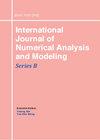直角网格上半线性二阶椭圆问题局部不连续Galerkin逼近的后验误差估计
IF 0.7
4区 数学
Q1 MATHEMATICS
International Journal of Numerical Analysis and Modeling
Pub Date : 2023-06-01
DOI:10.4208/ijnam2023-1034
引用次数: 0
摘要
本文章由计算机程序翻译,如有差异,请以英文原文为准。
A Posteriori Error Estimates for a Local Discontinuous Galerkin Approximation of Semilinear Second-Order Elliptic Problems on Cartesian Grids
. In this paper, we design and analyze new residual-type a posteriori error estimators for the local discontinuous Galerkin (LDG) method applied to semilinear second-order elliptic problems in two dimensions of the type (cid:0) ∆ u = f ( x ;u ). We use our recent superconvergence results derived in Commun. Appl. Math. Comput. (2021) to prove that the LDG solution is superconvergent with an order p +2 towards the p -degree right Radau interpolating polynomial of the exact solution, when tensor product polynomials of degree at most p are considered as basis for the LDG method. Moreover, we show that the global discretization error can be decomposed into the sum of two errors. The first error can be expressed as a linear combination of two ( p +1)- degree Radau polynomials in the x - and y (cid:0) directions. The second error converges to zero with order p + 2 in the L 2 -norm. This new result allows us to construct a posteriori error estimators of residual type. We prove that the proposed a posteriori error estimators converge to the true errors in the L 2 -norm under mesh refinement at the optimal rate. The order of convergence is proved to be p + 2. We further prove that our a posteriori error estimates yield upper and lower bounds for the actual error. Finally, a series of numerical examples are presented to validate the theoretical results and numerically demonstrate the convergence of the proposed a posteriori error estimators.
求助全文
通过发布文献求助,成功后即可免费获取论文全文。
去求助
来源期刊
CiteScore
2.10
自引率
9.10%
发文量
1
审稿时长
6-12 weeks
期刊介绍:
The journal is directed to the broad spectrum of researchers in numerical methods throughout science and engineering, and publishes high quality original papers in all fields of numerical analysis and mathematical modeling including: numerical differential equations, scientific computing, linear algebra, control, optimization, and related areas of engineering and scientific applications. The journal welcomes the contribution of original developments of numerical methods, mathematical analysis leading to better understanding of the existing algorithms, and applications of numerical techniques to real engineering and scientific problems. Rigorous studies of the convergence of algorithms, their accuracy and stability, and their computational complexity are appropriate for this journal. Papers addressing new numerical algorithms and techniques, demonstrating the potential of some novel ideas, describing experiments involving new models and simulations for practical problems are also suitable topics for the journal. The journal welcomes survey articles which summarize state of art knowledge and present open problems of particular numerical techniques and mathematical models.

 求助内容:
求助内容: 应助结果提醒方式:
应助结果提醒方式:


